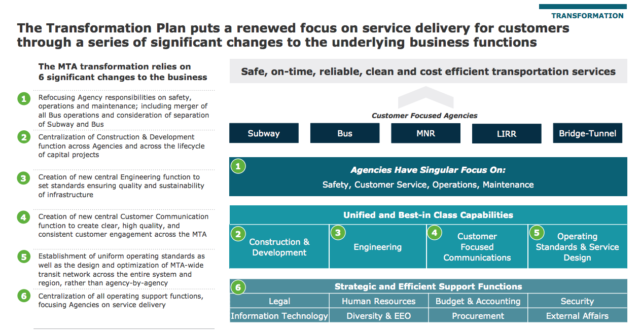A new MTA is on its way, though what it will look like is still an open question.
As they were more or less legally required to do, the MTA Board approved a reorganization plan put together by consulting firm AlixPartners when they were asked to vote on it at Wednesday's full board meeting. Now that the plan passed, with only one abstention and one vote in opposition, the MTA announced that the agency is starting a two-year process to install a series of new executives such as a Chief Transformation Officer, Chief Engineering Officer and additional management staff, who will oversee the creation of what MTA leadership has said will be a newer, sleeker agency.

AlixPartners and the MTA have suggested that the plan, which AlixPartners executive Foster Finley described as a "blueprint," could save the agency between $370 million and $530 million per year over three years by cutting up to 2,700 jobs. A key facet of the proposed AlixPartners plan relies on consolidating and centralizing areas such as human resources, engineering and capital construction into their own divisions. The working idea behind the proposal is that this allows the heads of transit agencies to focus entirely on delivering safe and effective service on their railroads and buses.
But critics of the plan have suggested that the centralization effort, which is meant to break duplicative jobs out of silos, could actually just create more and worse silos with confusing chains of command.
"Much of this plan is rearranging for the sake of rearrangement, consolidating for the sake of consolidation," Ben Fried of the TransitCenter told the board during the public comment period. "We consistently hear that separating functions like capital construction and engineering from the operating divisions will create disorganized chains of command, causing higher costs, more project delays, and worse service disruptions. Yet that is what this report recommends."
Veronica Vanterpool, a mayoral appointee to the MTA Board and the only member to vote against the plan, used the framing of the blueprint to explain her feelings on the plan. "A parallel example would be, I decide to remodel my home, I hire a contractor, I sign off on the design, but I have not reviewed the specs or details of the work," Vanterpool said at the meeting. "And I feel like this is what we're moving forward with today."
When Vanterpool specifically asked what the plan's reliance on centralization meant for signaling work and accessibility, two key facets of the Fast Forward plan, Alix executives gave somewhat conflicting answers. Finley told the board that "anything already underway or unique and specific to the agency will stay there," and that he had spoken with Byford about resignaling work. However, Jim Blaser, another AlixPartners executive presenting the plan with Foster muddied the waters a bit.
"If there's something that hasn't started or is not going well, we would put that in consideration for the centralized construction development group," Blaser said about the prospect of moving construction authority around, an answer that could theoretically include the massive line-wide resignaling efforts underpinning the Fast Forward effort, which has not begun yet.
The immediate effects of the MTA reorganization won't affect anyone's commutes, but a key part of the plan could wind up making things somehow worse for straphangers as the centralization begins to shift employees around. Take for example last Friday's transit meltdown, which stopped trains on the 1, 2, 3, 4, 5 and 6 lines at the start of the evening rush hour after the computer system that controls the train signals failed. Ellyn Shannon of the Permanent Citizens Advisory Council used her testimony at Monday's board meeting to suggest that as bad the issue was on Friday, splitting the current reporting structure into one where engineers answer to the MTA Board and not the agency presidents could have a "direct and negative impact on the riders."
Today we testified at the NYCT Committee meeting. The NYC Transit Riders Council says AlixPartner plan to split operations, planning, engineering, capital construction and possibly buses would have led to even more delays on Friday. pic.twitter.com/8msFqepg7f
— PCAC (@PCACriders) July 22, 2019
"The idea of reporting to two different leaders with different missions, when you're in a crisis that can create real conflict," Shannon told Streetsblog this week. "A crisis starts at an unknown, and from that point operations planning and engineering come together for all the what-if scenarios to figure out what's going on. Operations brings together contractors, work trains, mechanics. The idea of separating that out under a Transformation Officer that reports to the board is wrong. You need direct communication to a leader."
Rachael Fauss of Reinvent Albany also said the proposal was hard to understand from the perspective of providing good service. "Someone with engineering expertise can quickly identify physical problems, such as a rail safety issue, and make a better judgement as to whether a line needs to be shut down or if it is still safe to operate," Fauss said. "But if they're in a different building reporting to a different executive, it could make it harder for them to respond quickly."
And transit advocates weren't alone in asking why these jobs in each transit agency were seen as redundant and in need of consolidation. The question of why engineering jobs would move out of the transit agencies and into a separate engineering division didn't get a ringing endorsement from board members either. "I haven't talked to a single person who's said that taking IT out of the agencies, taking engineering out of the agencies was a great idea. They used words like 'disastrous' and 'end of the railroad,'" Norman Brown, a board member who represents the Metro-North railroad unions said during the hearing.
For Foye though, the potential for making things worse is overblown. "Engineering talent is going be left in the operating agencies of course, because they can't run the railroads without it," he said after the meeting in which the plan to consolidate engineering jobs under one roof was approved. "Where you draw the line is the question, and we're going to look at each of those things, but as we said it's a blueprint and the final decision is to come."
Whether this promise to take a good look at what to do will prevent the New MTA from avoiding the fate of New Coke or the close-but-n0-cigar New Mets remains unknown, with multiple board members suggesting the plan is a kind of living document that can be amended as time goes by. But even as the larger shell of the plan has been put in place, it would appear someone is going to have to answer questions of some kind, as City Council Speaker Corey Johnson has now promised a hearing on the reorganization.






